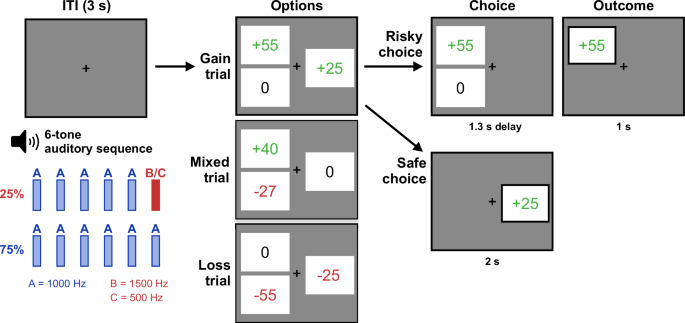
Surprising sounds influence risky decision making
Nature Communications volume 15, Article number: 8027 (2024 ) Cite this article
Adaptive behavior depends on appropriate responses to environmental uncertainty. Incidental sensory events might simply be distracting and increase errors, but alternatively can lead to stereotyped responses despite their irrelevance. To evaluate these possibilities, we test whether task-irrelevant sensory prediction errors influence risky decision making in humans across seven experiments (total n = 1600). Rare auditory sequences preceding option presentation systematically increase risk taking and decrease choice perseveration (i.e., increased tendency to switch away from previously chosen options). The risk-taking and perseveration effects are dissociable by manipulating auditory statistics: when rare sequences end on standard tones, including when rare sequences consist only of standard tones, participants are less likely to perseverate after rare sequences but not more likely to take risks. Computational modeling reveals that these effects cannot be explained by increased decision noise but can be explained by value-independent risky bias and perseveration parameters, decision biases previously linked to dopamine. Control experiments demonstrate that both surprise effects can be eliminated when tone sequences are presented in a balanced or fully predictable manner, and that surprise effects cannot be explained by erroneous beliefs. These findings suggest that incidental sounds may influence many of the decisions we make in daily life.
The ability to respond appropriately to unexpected events is crucial for survival because such events can signal potential rewards or threats. Unexpected events have been theorized to motivate exploratory behaviors, allowing humans to learn about unfamiliar stimuli1 and detect environmental changes2,3. Appropriate responses to environmental uncertainty are a hallmark of adaptive behavior4.





/cloudfront-us-east-2.images.arcpublishing.com/reuters/LUKPFIH5S5JKBMJFDLHCRXEDRE.jpg)













